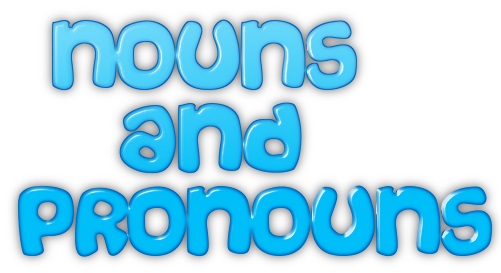What Is Noun And Pronoun - Noun To Pronoun Worksheets : A pronoun takes the place of a noun or a group of words acting as a noun.. * demonstrative pronoun * indefinite pronoun * intensive pronoun * interrogative pronoun * object pronoun * personal pronoun * possessive pronoun * reciprocal pronoun * reflexive pronoun * relative pronoun. (grammar) a type of noun that refers anaphorically to another noun or noun phrase, but which cannot ordinarily be preceded by a determiner and english requires the use of prepositional phrases and reflexive and other pronouns to communicate what the middle morpheme could alone. Pronouns make up a small subcategory of nouns. Nouns are one of the eight parts of speech in the english language. Pronouns are actually a subclass of nouns because they often replace a noun and can complete the same function in a sentence.
Nouns and pronouns are important parts of a language. Nouns are the objects or people of a sentence. What are examples of pronouns? Do you see how the pronoun he took the place of the noun erik weihenmayer? Melbourne (it refers to only one particular city), steve (refers to a particular person)
Nouns are one of the eight parts of speech in the english language.
.as subjective pronouns, objective pronouns, possessive pronouns, demonstrative pronouns, indefinite pronouns, and reflexive pronouns. Nouns are used to name people, places, objects, events, occurrences, etc. Often, these pronouns are specific and are used to replace a proper noun, a collective group of people or things. A pronoun is a word that takes the place of a noun. Nouns can be simply the names of people, objects, places or ideas. These are personal pronouns, but there are nine different types of pronouns. Who wants a bag of jelly beans? She will bring some jam. Types of pronouns include personal. What is the antecedent in this sentence In the same vein, based on the grammatical premise that a pronoun is a word that is used in the place of a noun, we can identify a pronoun used in the. The distinguishing characteristic of pronouns is that they can be substituted for other nouns. Pronouns can be subjects of the sentence (i, he, she, it, you, we, they) or express possession (his, her, your, my, mine, yours, its.
Home english grammar what are nouns and pronouns? Melbourne (it refers to only one particular city), steve (refers to a particular person) A noun is a word used to identify, or name, any class people, places, and things. In the same vein, based on the grammatical premise that a pronoun is a word that is used in the place of a noun, we can identify a pronoun used in the. What are examples of pronouns?

Pronouns which are not known which nouns are used are called indefinite pronouns.
Types of pronouns include personal. Pronouns make up a small subcategory of nouns. In english, pronouns only take the gender of the noun they replace in the 3rd person singular form. The logical classifications (pronouns are a kind of noun, and possessive determiners are not pronouns) are clearly more simple and therefore easier to understand. I'm elizabeth o'brien, and my goal is to get you jazzed about grammar. Pronouns can be subjects of the sentence (i, he, she, it, you, we, they) or express possession (his, her, your, my, mine, yours, its. Like all nouns, they are either people, places, objects, activities, or ideas. He, she, him, her, them, they, us, we, you, i, that, which, whom, those. Anybody, everybody, nobody, anyone, anyone, anyone, no one. Proper nouns are specific, capitalized nouns. Explore the list of different types of nouns and how to use them correctly with examples. Pronouns refer to either a noun that has already been mentioned or to a noun that does not need to be named specifically. We sometimes use pronouns instead of a pronouns substitute for nouns when we want to avoid using the name of the object or person again in the sentence.
This page has lots of examples of each type, an explainer video, and an interactive test. We can also put the noun and pronoun in the same sentence. The 2nd person plural pronouns are. Without pronouns, we'd constantly have to repeat nouns, and that would make our speech and writing repetitive, not to mention cumbersome. Home english grammar what are nouns and pronouns?

A proper noun is a name which refers only to a single person, place, or thing and there is no common name for it.
(grammar) a type of noun that refers anaphorically to another noun or noun phrase, but which cannot ordinarily be preceded by a determiner and english requires the use of prepositional phrases and reflexive and other pronouns to communicate what the middle morpheme could alone. * demonstrative pronoun * indefinite pronoun * intensive pronoun * interrogative pronoun * object pronoun * personal pronoun * possessive pronoun * reciprocal pronoun * reflexive pronoun * relative pronoun. Anybody, everybody, nobody, anyone, anyone, anyone, no one. Pronouns can be subjects of the sentence (i, he, she, it, you, we, they) or express possession (his, her, your, my, mine, yours, its. Both nouns and pronouns are important concepts in grammar and are what are nouns. A noun is the name of person, place ,animal or thing. A pronoun is a word that replaces a noun. Types of pronouns include personal. A pronoun is a word that takes the place of a noun. Pronouns which are not known which nouns are used are called indefinite pronouns. The distinguishing characteristic of pronouns is that they can be substituted for other nouns. These pronouns are divided into different categories. Distributive adjective qualifies the noun distributive pronoun show persons or things in individual or in separate groups.

0 Komentar